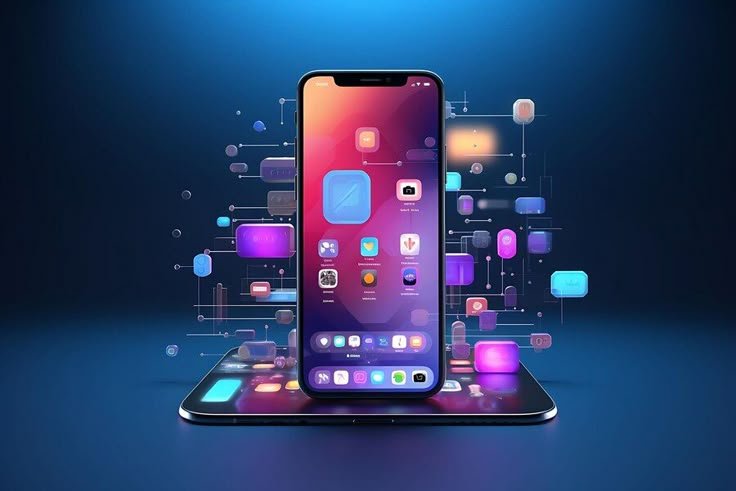Blog
How Blockchain is Transforming Mobile Applications
Mobile App Development ▪ 2025-03-07

Blockchain technology is revolutionizing industries across the globe, and mobile applications are no exception. By providing enhanced security, transparency, decentralization, and efficiency, blockchain is transforming the way mobile apps operate. From secure transactions to data privacy, the integration of blockchain in mobile applications is setting new industry standards.
In this blog, we’ll explore how blockchain technology is shaping mobile applications, its benefits, challenges, and future potential, and why businesses should consider adopting blockchain-powered mobile apps.
What is Blockchain Technology?
Blockchain is a decentralized, distributed ledger technology (DLT) that records transactions securely across multiple nodes, preventing any single entity from altering or manipulating the data. Each block in the chain contains transaction records and is secured using cryptographic hashes. This ensures immutability, security, and trust in digital transactions.
Key Features of Blockchain:
-
Decentralization: No single authority controls the data.
-
Transparency: Transactions are publicly verifiable.
-
Security: Strong encryption prevents hacking and fraud.
-
Immutability: Data cannot be altered once recorded.
-
Smart Contracts: Automates and executes agreements without intermediaries.
With these features, blockchain technology is driving innovation in mobile app development, making applications more efficient, secure, and user-centric.
How Blockchain is Transforming Mobile Applications
1. Enhanced Security & Data Privacy
Blockchain’s decentralized structure provides robust security measures, protecting mobile apps from hacking, fraud, and unauthorized data access. Since data is encrypted and stored across multiple nodes, it becomes nearly impossible for cybercriminals to manipulate or corrupt information.
Use Cases:
-
Secure messaging apps (e.g., Status, Dust)
-
Decentralized identity verification
-
Encrypted file storage and sharing
2. Transparent & Tamper-Proof Transactions
Blockchain ensures tamper-proof transactions, making mobile payment apps more reliable and secure. Users can track transactions in real-time, enhancing trust and reducing disputes.
Use Cases:
-
Cryptocurrency wallets (e.g., Trust Wallet, MetaMask)
-
Decentralized banking apps
-
Transparent crowdfunding platforms
3. Faster and Cost-Effective Mobile Payments
Traditional payment gateways involve multiple intermediaries, leading to high transaction fees and delays. Blockchain eliminates third-party involvement, allowing for faster and cheaper cross-border transactions.
Use Cases:
-
P2P payment apps (e.g., Cash App with Bitcoin support)
-
Smart contract-based financial agreements
-
Cryptocurrency payment gateways
4. Decentralized Applications (DApps)
DApps run on decentralized blockchain networks, eliminating the need for central servers. These apps offer enhanced security, censorship resistance, and better user control over data.
Use Cases:
-
Decentralized social media platforms
-
Gaming applications with NFT support
-
Blockchain-based voting apps
5. Smart Contracts for Automation
Smart contracts are self-executing agreements stored on a blockchain. They eliminate the need for intermediaries, ensuring faster execution, reduced costs, and improved trust.
Use Cases:
-
Legal contract automation
-
Supply chain and logistics tracking
-
Real estate transactions
6. Supply Chain Management
Blockchain enables real-time tracking and transparency in supply chains, preventing fraud and ensuring authenticity in product deliveries.
Use Cases:
-
Food safety tracking (Walmart, IBM Food Trust)
-
Luxury goods authentication
-
Pharmaceutical supply chain management
7. NFT Integration in Mobile Apps
Non-fungible tokens (NFTs) are revolutionizing digital ownership and asset management. Mobile apps integrated with NFTs allow users to buy, sell, and trade digital assets securely.
Use Cases:
-
Gaming apps (Axie Infinity, Decentraland)
-
Digital art and collectibles marketplaces
-
Music and content distribution platforms
8. Improved Advertising and Marketing
Blockchain eliminates ad fraud and enhances transparency by verifying genuine clicks and impressions. This helps businesses optimize their marketing budgets effectively.
Use Cases:
-
Transparent digital advertising networks
-
Blockchain-powered affiliate marketing
-
User incentive-based ad viewing (BAT – Brave Browser)
Challenges of Integrating Blockchain in Mobile Applications
1. Scalability Issues
Blockchain networks, especially public ones like Ethereum and Bitcoin, face scalability challenges due to slower transaction speeds and high energy consumption.
2. Regulatory Uncertainty
Many countries lack clear regulations on blockchain and cryptocurrencies, creating legal compliance challenges for mobile app developers.
3. High Development Costs
Implementing blockchain technology requires specialized expertise, leading to higher initial investment costs for businesses.
4. Complex User Experience
Blockchain-based mobile apps often have complicated interfaces, making them difficult for non-technical users to navigate.
5. Limited Adoption
Despite its advantages, mass adoption of blockchain mobile apps is still in its early stages, as many users are unfamiliar with the technology.
Future of Blockchain in Mobile App Development
1. Adoption of Layer 2 Solutions
Layer 2 solutions like Polygon, Lightning Network, and Optimistic Rollups will enhance blockchain scalability, making mobile apps faster and more efficient.
2. Decentralized Finance (DeFi) Expansion
DeFi-powered mobile apps will offer decentralized lending, borrowing, and trading services without banks or intermediaries.
3. AI and Blockchain Integration
Combining AI with blockchain will enhance automation, fraud detection, and personalized experiences in mobile applications.
4. Cross-Platform Blockchain Apps
Future mobile apps will integrate cross-chain functionality, allowing seamless transactions between different blockchain networks.
5. Governments & Enterprises Adopting Blockchain
Governments and large enterprises will increasingly use blockchain for secure digital identity management, taxation, and healthcare records.

